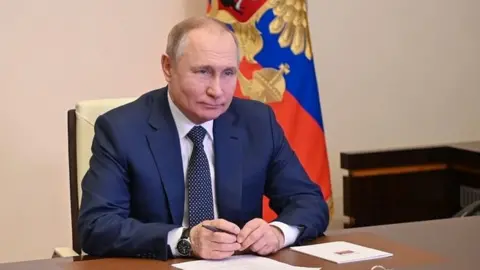Economic Crime Bill: MPs back measures to speed up oligarch sanctions
 EPA
EPAA plan to harden and quicken UK sanctions against allies of Vladimir Putin has got through the House of Commons at rapid speed.
The government says its Economic Crime Bill will stop wealthy Russians using the City of London for money laundering and hiding ill-gotten gains.
All parties agreed to back it in an effort to help stymie Mr Putin's invasion of Ukraine.
Home Secretary Priti Patel called the Russian president a "gangster".
During the debate - condensed into a single day to try to get the measures into place as quickly as possible - she also said: "The UK must send a strong signal that it will not be a home for corruption."
The bill, which now goes to the House of Lords and is expected to become law later this month, contains several measures to tackle oligarchs and companies associated with Mr Putin.
These include:
- Forcing foreign owners of UK companies to declare and verify their identities
- Prison sentences of up to five years for those who fail to do so
- Strengthening Unexplained Wealth Orders - powers brought into force in 2018 to counter suspected criminal money invested in property, but used only four times since then
- Making it simpler for UK authorities to sanction individuals already punished by allies such as the US and EU

What is the UK's problem with Russian money?

The UK is thought to be awash with Russian cash and other money looted from the former Soviet Union.
That cash is buried in vast amounts of property - from office blocks to mega mansions - and the true owners are hidden in a web of secretive shell companies. These are organisations that only exist on paper and are registered in offshore tax havens.
The Economic Crime Bill is meant to help end that - and it has been promised since 2016. It was shelved just a month ago amid much criticism - including from the fraud minister, Lord Agnew, who quit.
Now, the invasion of Ukraine has prompted a government U-turn.

Since Russia began the invasion of Ukraine, UK assets held by some individuals, banks and firms close to Mr Putin have already been frozen.
But a number sanctioned by the US or the EU have not been targeted by the UK.
An Economic Crime Bill has been promised for several years, amid concerns that the City of London is being used as a conduit for illegal funds, with wealthy figures close to Mr Putin coming under particular suspicion.

War in Ukraine: More coverage

The war, which has seen more than 1.7 million people flee Ukraine, has increased the demand for those associated with the Russian president to face sanctions.
During the Commons debate, some MPs called for the UK government to go further and seize - rather than just freeze - assets belonging to oligarchs.
Several amendments to the government's plans were defeated in votes and the bill as a whole got through the Commons unopposed.
For Labour, shadow home secretary Yvette Cooper said: "We must vow that never again will we allow our major institutions to be so corrupted and so influenced by corrupt elites, that we will give those involved in corruption and economic crime no place to hide, be it for Russia or anyone else in the world, we will no longer stand for this here in the UK."
Recent research by campaign group Transparency International suggests £1.5bn worth of UK property has been bought by Russians accused of corruption or links to the Kremlin since 2016.
